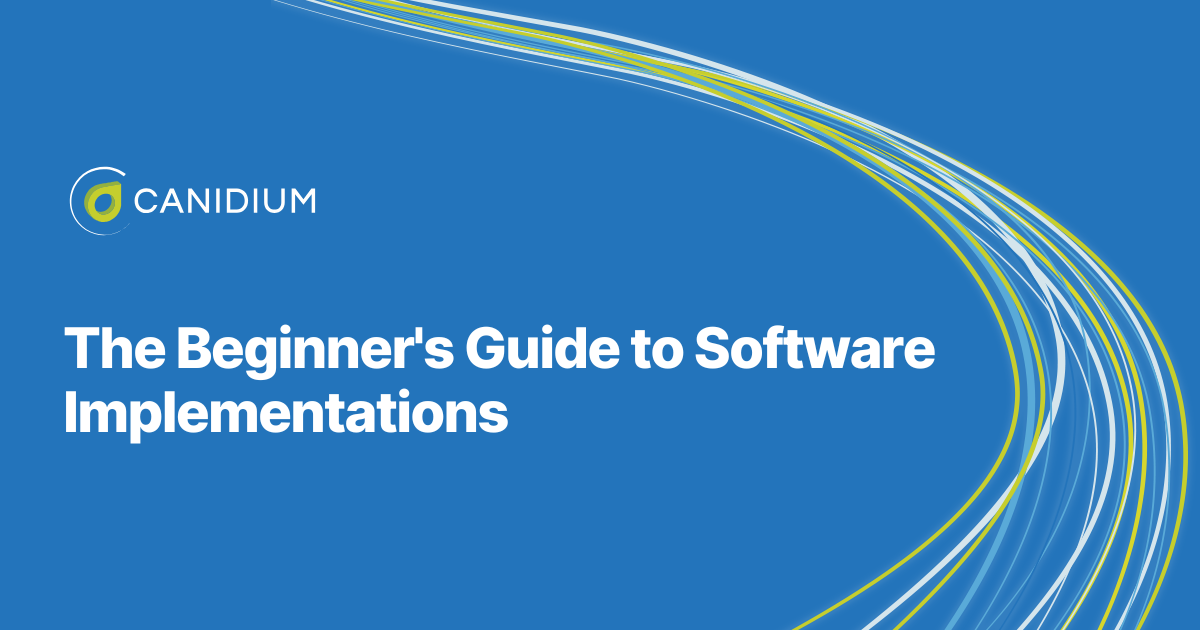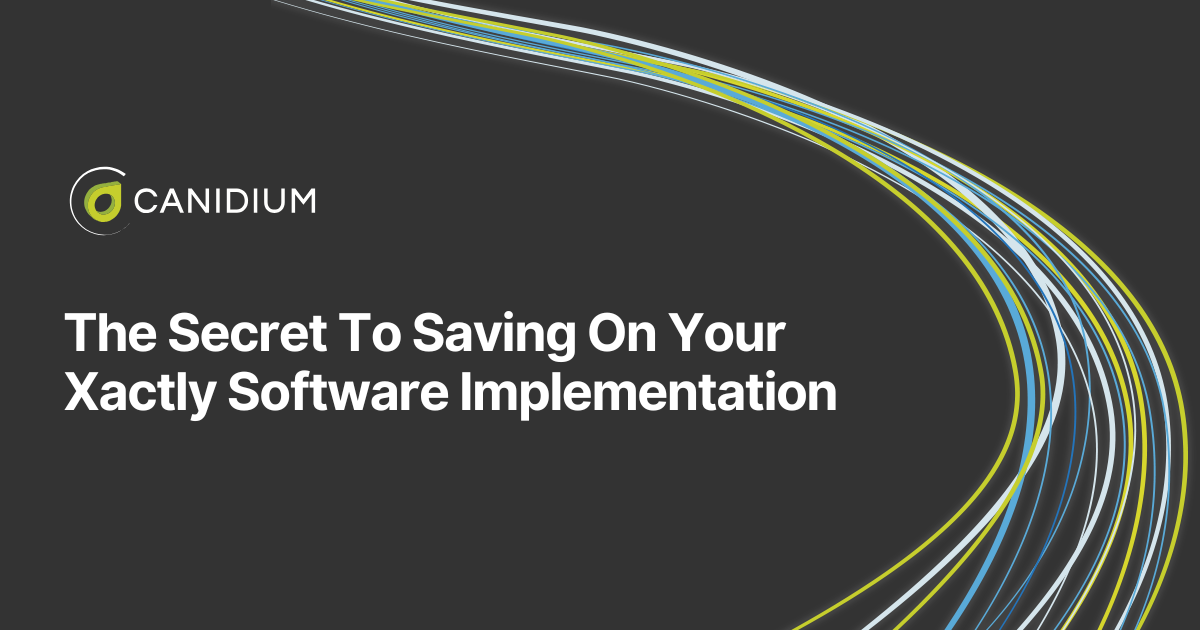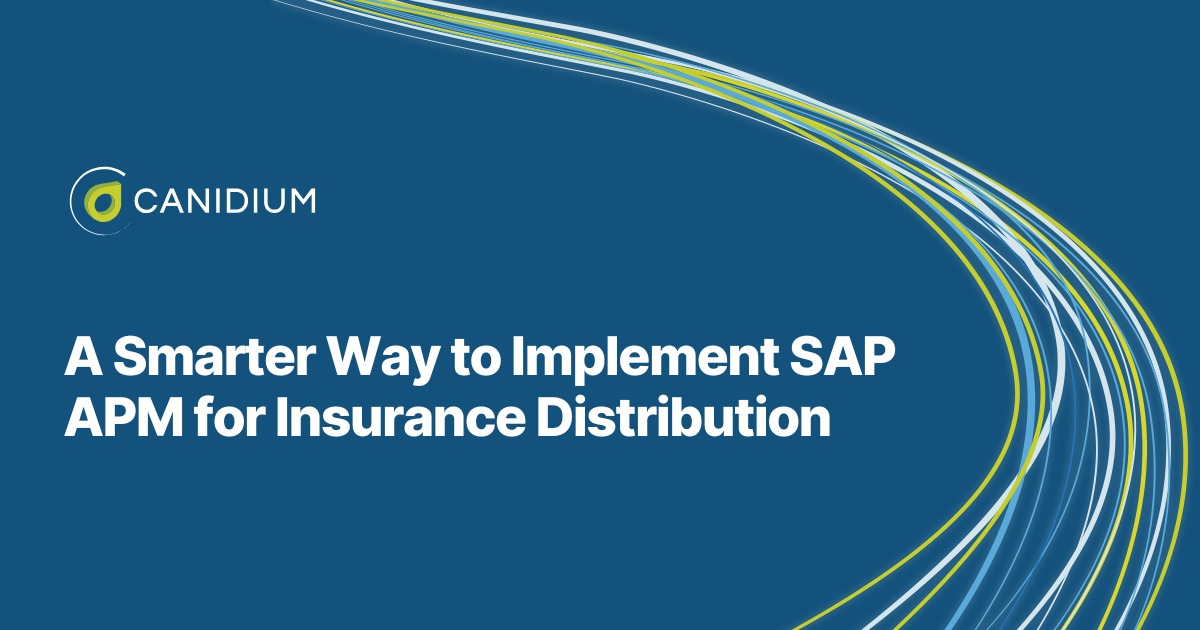New software solutions have the potential to reduce your workload while simultaneously improving your efficiency. Yet, they force you to overhaul your existing processes and learn to use new tools. At the same time, you do not want to become dependent on your software implementation partner to resolve ongoing skill gaps with your new solution. The bottom line is that you need to become self-sufficient.
Reskilling can be frustrating. However, learning your new incentive compensation solution is much easier when you have the right resources to guide you.
At Canidium, our teams of expert implementation and managed service specialists help clients adjust to their new systems. We ensure that our clients have the skills and resources to successfully maximize the value of their newly integrated system.
This guide pulls from our team's experience, explaining how to become self-sufficient with your incentive compensation management solution. To round out your understanding, we will go over the following topics:
- Why becoming self-sufficient is worth it
- Three training resources for SuccessFactors Incentive Management (SFIM) users
- Leveraging training resources to become self-sufficient
Why Becoming Self-Sufficient Is Worth It
Achieving self-sufficiency in compensation management gives you more control over the incentive processes, allows you to make timely adjustments, and helps you minimize reliance on external consultants. This independence leads to faster decision-making, enhanced customization, and potentially significant cost savings.
Moreover, being self-sufficient means your team can better understand and respond to internal requirements and market changes, ensuring your incentive programs remain competitive, risk-tolerant, and effective. By extracting maximum value from your incentive management solution, you improve your comp admin's performance, which in turn can improve your entire organization's sales performance.
The benefits of self-sufficiency for comp admins are numerous. However, the core advantages you can garner through training are as follows:
.png?width=1920&height=1080&name=The%20benefits%20of%20software%20self-sufficiency%20(1).png)
Increased Control and Autonomy
When you become self-sufficient in managing your incentive programs, you gain complete control over every aspect of the process. This means you can immediately adjust incentive plans without waiting for external consultants. This agility allows you to respond swiftly to business needs, market trends, and internal feedback, ensuring your incentive programs remain relevant and practical.
Faster Decision-Making
Relying on external consultants often means delays due to scheduling, availability, and the time required to communicate your needs and get feedback. You eliminate these delays by training your team to manage the incentive system independently. Your team can make timely decisions and implement real-time changes and optimizations. This responsiveness is crucial in dynamic business environments where timing can significantly impact performance and outcomes.
Cost Savings
Engaging external consultants can be expensive, especially for ongoing support and customizations. However, you can significantly reduce these costs by investing in training and becoming self-sufficient. The initial investment in training pays off in the long run, as your team can handle tasks that would otherwise require costly external assistance. These savings can be redirected towards other strategic initiatives, further enhancing your organization's efficiency and performance.
Improved Adaptability to Market Changes
Markets are constantly evolving, and staying competitive requires continuous adaptation. A self-sufficient incentive management team can quickly respond to market changes by adjusting incentive plans to align with new conditions. Whether changing compensation structures to attract top talent or modifying targets to reflect new business priorities, having an in-house team ready to adapt ensures that your incentive programs remain effective and competitive.
Increased Engagement and Satisfaction
When your team is empowered to manage and adjust incentive programs, they are more likely to feel engaged and invested in the process. This sense of ownership can lead to higher job satisfaction and motivation. Moreover, having a team that understands the intricacies of the incentive system can lead to more transparent and fair programs, which can boost overall employee morale and trust in the management.
3 Training Resources For SuccessFactors Incentive Management (SFIM) Users
Implementing a robust software solution like SuccessFactors Incentive Management (SFIM) can significantly enhance your organization's ability to motivate and reward employees effectively. However, to fully leverage SFIM's power, you must be well-versed in its functionalities and best practices. This learning process is where comprehensive training becomes essential.
Practical training ensures your team can navigate and utilize the system efficiently. It empowers employees to customize and optimize your incentives to meet your unique business needs. Whether you are new to SFIM or looking to deepen your expertise, investing in the right training resources is crucial for maximizing the benefits of your incentive management system.
You should consider using three key training resources for SFIM users: Vendor Microlearning, Standard Implementation Partner Training, and Premium Implementation Partner Training.
Vendor Microlearning
Software vendors typically offer self-paced generalized training resources to help users master the basics. This type of training involves short, focused learning sessions that users can complete at their own pace. For instance, SAP's microlearning center offers a variety of courses covering the fundamentals of SFIM.
Microlearning is convenient as it allows users to learn during the project without overwhelming their schedules. Vendor courses are excellent resources for ongoing skill maintenance after a solution goes live. At the same time, these courses are vital during the implementation process. They ensure that your team is familiar with the system's basic functionalities when User Acceptance Testing (UAT) begins.
Microlearning sessions are crucial for building a foundational understanding of SFIM. However, they do not cover the specific workflows or configurations inherent to your unique system design. You must contact your implementation partner or managed service provider for customized training.
Standard Implementation Partner Training
Standard training from Canidium's team of experts includes comprehensive sessions designed to cover essential aspects of SFIM. This training typically involves around 20 hours of instruction, focusing on key areas such as embedded analytics, configuration navigation, inbound feeds, rule compliance, and rate tables.
The standard training option also includes "show and share" sessions throughout the configuration process to familiarize users with the system's look and feel. This approach ensures that users know the system's capabilities and how to navigate and utilize them effectively.
Who Is Standard Training Best For?
- New Users and Teams: Ideal for individuals or teams new to SFIM. Those who need a thorough understanding of their configured system's unique functionalities and workflows.
- HR and Sales Managers: Useful for those overseeing the implementation of incentive programs who need to understand the key components and how to manage them.
- IT Staff: Beneficial for IT personnel responsible for the technical setup and maintenance of the system.
- General Users: Suitable for team members using SFIM regularly who need to be comfortable navigating and utilizing the system.
Premium Implementation Partner Training
Premium offerings are available for organizations seeking more in-depth training. Premium training includes all the standard components but provides additional hours and advanced workshops.
Typically, Canidium's premium training option involves five advanced workshops totaling 10 extra hours of training. These sessions delve deeper into specific topics like test case writing, advanced reporting and analytics, security settings, and pipeline execution.
While premium training is costlier, it offers a more extensive understanding of the system, enabling users to handle complex scenarios and customize the system to a greater extent.
Who Is Premium Training Best For?
- Advanced Users: Best suited for users with a basic understanding of SFIM who want to deepen their knowledge and skills.
- Technical Leads and IT Managers: Ideal for those who need to handle complex technical setups, configurations, and customizations within the system.
- Business Analysts and Consultants: Beneficial for those who need to analyze and optimize incentive plans and reporting, ensuring they are fully aligned with business goals.
- Project Managers: Useful for project managers overseeing large-scale implementations who must understand advanced features and ensure seamless integration and execution.
- Organizations with Complex Needs: Perfect for companies with intricate incentive plans and requirements needing more detailed training and advanced capabilities.
Leveraging Training Resources to Become Self-Sufficient
Achieving self-sufficiency in incentive management is not just a goal but a strategic advantage that empowers your organization to take complete control of its incentive processes. You can make timely adjustments, enhance customization, and realize significant cost savings by minimizing reliance on external consultants. This autonomy enables your team to better understand and respond to internal requirements and market changes, ensuring your incentive programs remain competitive and effective.
The benefits of self-sufficiency extend beyond operational efficiency. When your team has the skills and knowledge to manage SFIM independently, they can implement changes swiftly, tailor the system to meet specific needs and drive improved performance. This, in turn, enhances your organization's overall performance, particularly in sales, by ensuring that incentive programs are aligned with strategic goals and responsive to market dynamics.
Investing in the proper training resources is key to achieving this level of self-sufficiency. Vendor microlearning provides a convenient way to build foundational knowledge, ensuring users know the system's basic functionalities. Standard implementation partner training offers comprehensive sessions that cover essential aspects and help users navigate and utilize SFIM effectively. For those seeking a deeper understanding and the ability to handle complex scenarios, premium training provides advanced workshops that delve into specific topics and allow for extensive customization.
Now that you know how to improve your experience with SFIM through training, your next step is to focus on increasing your solution adoption rates. Learn how to solve the software adoption problem here.


-1.png)





